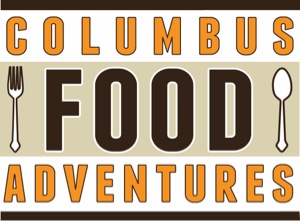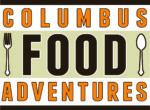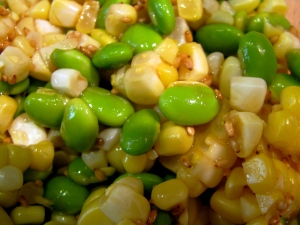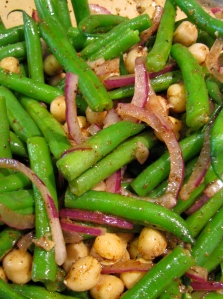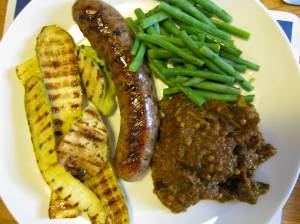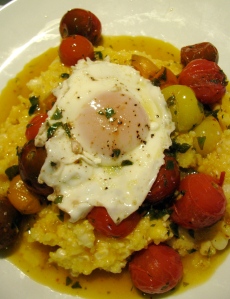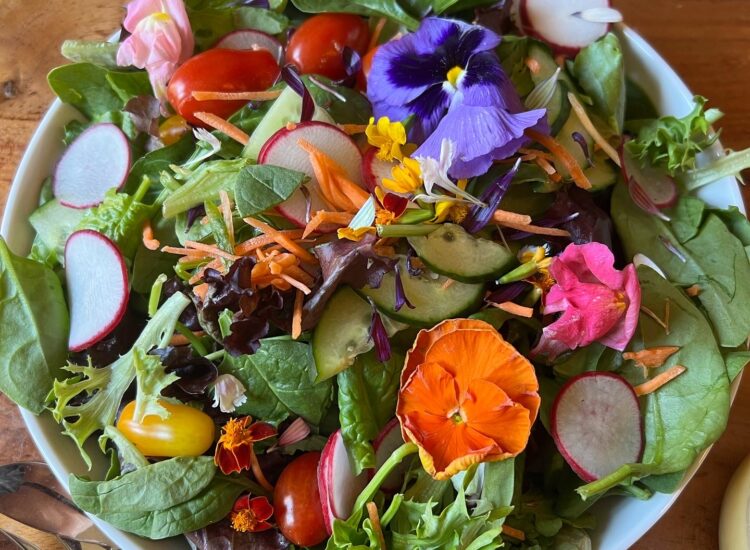Hard to believe that it is September. The farmers market still seems to be in full summer mode but the fallen leaves you see on the way there, give away the secret that fall is around the corner (that and the fact that football season started). The North market was a riot of color this weekend with a huge array of tomatoes, eggplants and watermelons. I counted at least 10 types of eggplants at the various stalls. I think you can count 8 in this one photo alone. Once again I am amazed at how homogenous grocery store produce is compared to the variety that exists. One seed website I looked at had 65 different types of eggplants with names such as black beauty, prosperosa and rosa bianca.
This brings me on to the first thing I learned this weekend:
Doing research on the different types of eggplants and trying to work out what the green (thai or kermit) and orange (turkish or italian) were, I learned that eggplants are either male or female and that the male ones have fewer seeds and are therefore less bitter. It turns out that you can sex an eggplant by looking at its bottom. If the indentation is deep and dash shaped it is a female and if it is shallow and round it is male. Sometimes though it is obvious, even without close examination!
Some of the new things I spotted this week were elderberries (smaller than their english cousins), leeks, edamame and okra. There were some baby onions and three colors of beets (red, gold and white). I bought a lot, carried away in part by having someone else to cook for all weekend.
I bought four types of tomatoes – orange amana, green zebra and red brandywine and a mix of heirloom cherry tomatoes.
The second thing I learned this weekend was to be suspicious when the stall holder knows nothing about what they are selling and asks you what you are planning to do with them and how to cook them. This is what happened with the okra.
The okra as you can see was beautiful and I hadn’t cooked it before, although I have eaten all sorts of dishes containing it under various guises bindi, ladies fingers and okra. It is very popular in Sri Lankan and Indian cuisine. I had read something last week (can’t remember where) about drying okra very carefully to make sure that it minimize sliminess, so I thought that I was ready to go…..
The third thing I learned this weekend was that over mature okra pods are tough and woody and are used to make paper and rope and are certainly inedible, and when you buy them from someone who doesn’t know anything about them, the odds are that they weren’t picked early enough and two thirds of them are of the woody variety. The fourth thing I learned is that it is better to find this out before you spend hours cooking something and hoping that it will soften, than afterwards when it is almost inedible.
The fifth thing i learned is that fresh edamame have furry pods and are delicious, but being smaller (in this case) they are laborious to shell for a recipe that calls for 2 cups!
I have done a lot of cooking in the last few days so here is the list of recipes and some photos:
Corn and Edamame salad from Veganomicon
Apart from shelling the edamame this is very easy and has a tasty sesame dressing. It would be super easy although not quite as good with frozen and corn and edamame.
Harissa Bean Salad from Peter Berley’s Fresh Food Fast which I borrowed from the library and have now ordered from Amazon. It is a great book full of tempting recipes for all seasons. Lesson 6 in reading the recipe carefully before you start though – I was hoping to use up some harissa paste, but you actually roast and grind spices for the dressing (easier than it sounds and very tasty).
Asian cucumber salad again from Peter Berley, but without the seaweed. Good, but not that exciting.
Okra with onions from Madhur Jaffrey’s the essential Madhur Jaffrey. Delicious flavor, but time consuming to cook and make sure you choose your okra carefully!
Grilled Zucchini with mint oil from the flexitarian table. My least favorite recipe, the mint was over powered by the garlic and red pepper and it made the zucchini much greasier than my usual method.
White Sangria – my own concoction. The rest of the riesling from the apple sorbet and some juice left from smoothie making.
Riesling, orange and mango juice, soda water, southern comfort, mint leaves and a sliced white peach.
Fruit salad peaches, watermelon, raspberries, mint, grapes and plums. All local.
Apple Ginger Sorbet from The Perfect Scoop by David Lebovitz that I poached from the blog gluten free girl. Made with my new-old ice cream maker, that Andy bought me on Craig’s list as a subtle hint that I should make him ice cream. It turned out really well for a first attempt (I think).
I also finally made ginger syrup which I have been talking about for weeks. It is surprisingly dark probably due to the turbinado sugar. Ginger mojitos here I come!
But the winning recipe of the weekend (I saved the best until last) was fresh corn polenta with sautéed cherry tomatoes. This again is a Peter Berley recipe and you can tell that it is good because he has it in both of his books. It is so good that it had us purring like cats while we ate it for brunch. Here is the recipe:
Fresh corn polenta with sautéed cherry tomatoes, from The Flexitarian Table and Fresh Food Fast by Peter Berley.
Ingredients:
Polenta
3 cups water
2 tbsp butter
1 tsp sea salt
1 cup medium corn grits/polenta (I recommend Shagbark grits)
I cup corn kernels (from 1 large or 2 small ears)
Cherry tomatoes
2 pints of cherry tomatoes
1/4 cup of extra virgin olive oil
2 garlic cloves finely chopped
1/2 tsp red pepper flakes
1/4 cup of chopped mixed fresh herbs (eg oregano, parsely, basil, tarragon)
salt and pepper
optional garnishes – fried eggs, freshly grated parmesan.
In the Flexitarian recipe he adds a scallion (white part in with tomatoes and green in the polenta), but I didn’t have any.
In a saucepan, mix three cups of boiling water (I boil it in the kettle to save time and energy), salt, butter, grits and fresh corn. Stir until it returns to the boil. Reduce the heat and simmer uncovered for 5-7 minutes stirring occasionally until the polenta is thick and smooth. Cover and keep warm (Berley suggests putting it in a 200 deg F oven, but I found it kept warm enough just in the pan). I also started the tomatoes while the polenta was cooking.
Put the tomatoes in a cast iron frying pan (skillet) ideally big enough to hold them in a single layer, over a high heat. Add the oil, garlic, red pepper and sauté until the tomatoes soften and begin to exude their juice (about 3-4 minutes). Stir in the herbs and sauté for another 2 minutes. Season with salt and pepper. Divide the polenta into 4 shallow soup plates and spoon the tomatoes on top. Can be served with fried eggs on top and/or with freshly grated parmesan cheese. (I forgot the cheese and didn’t miss it).
I should add that I was ably assisted for most of these dishes by a very able sous-chef and taster! It was fun shopping, cooking sharing, eating and purring with a friend.
